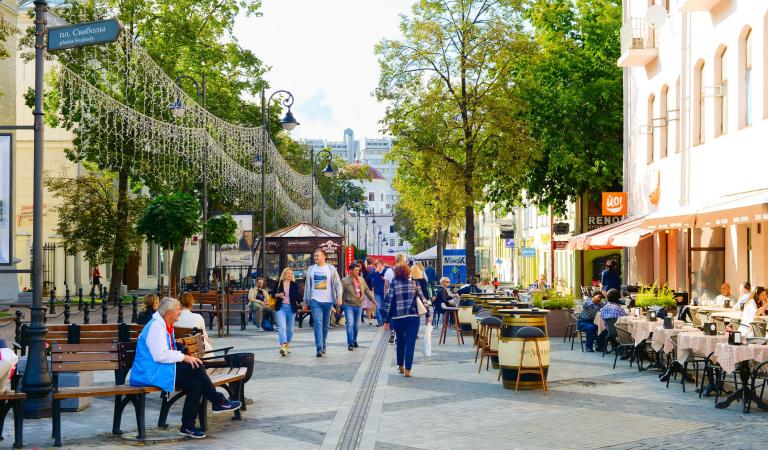This TEFL Story comes from Alison Ramage Patterson who decided at 37 to change her career and take the CELTA. From there, she has moved from London to Russia, Spain, Malaysia, China, Kazakhstan, Saudi Arabia… and many more places!
How did your TEFL story begin?
I was a late starter with TEFL taking my CELTA at IH London in 2001 – when I was 37 – we had our first teaching practice sessions the day the Twin Towers were hit. After time spent in publishing, politics and then finance I knew it was time for a change. I had to leave the dark UK winters and I did that “What Colour is Your Parachute” work sheet to find out what sort of career would suit me. I worked near International House London so got more information there. I still remember my interview with David (I think), who asked me how I would elicit the meaning of ‘hesitate’ (‘He hesitated before jumping’). I had absolutely no preconceived ideas of what the course was going to be like.
As I was looking to start work in January, vacancies were all pretty limited at that time, so I ended up at the IH in Zelenograd outside Moscow. I lasted three months!
Where did a career in TEFL take you?
I think I only ever made a couple of clearly thought out career decisions, mostly it was just circumstances. After leaving Russia, I realised that it would all be a bit easier if I spoke something of the language, so I went to Spain and did an eight-week course with the IH schools there (Sevilla, Madrid, Donostia, Barcelona). It was a mixed experience. I learned a lot about Spain and picked up enough basic Spanish to get by. I loved Barcelona and ended up living there for five years. I worked for a variety of schools and freelance.
By 2007, it was clear that things were going nowhere for me in Barcelona. So I bit the bullet and took a job with IH Kuala Lumpur. Malaysia was an experience and I met my lovely Canadian husband, Richard, there. As the two latest arrivals we were assigned to teach on a two-week intensive course for a fabulous group of professors from Ulan Batur University in Mongolia.
Richard and I ended up leaving KL early and we went to China, where Richard had worked at what was once a very good school. We spent some months in Xiamen, which was absolutely fascinating on so many levels! Sadly, the school owner changed and introduced a new system which wasn’t what we wanted.
Thus, we went to IH Almaty, a really good school with an excellent manager. Here we certificated at IELTS examiners which became fundamental to our future career successes.
After a year in Kazakhstan we went to IH Seville to do our Deltas.
Subsequently, Richard went to Libya and I went to Riyadh. I did lots of IELTS examining, did the IH online teacher training course and started my MA (TESOL). I took on a new role of Head of Professional Development for 90 female teachers. It was hell! But, it was a really good learning experience and I produced some useful research material for my MA which was subsequently published and presented at conferences (Teacher Observations: From Evaluative to Developmental).
I can’t remember how it came about but I started writing materials. Mostly it was for Middle East Publications. I did quite a lot although mostly for ‘closed’ courses, although I do have a book on Amazon – Unlock Stage 2 teachers’ book! During this period, I completed my MA, did lots and lots of IELTS, frantically reducing the mortgage of our home in Menorca.
After about four years we decided to leave, spent some time in Canada, then we moved to Menorca in 2014.
Since moving to Menorca we’ve done a variety of material writing work. Re-purposing material for the MENA market, working on English Language and Literature materials for English speaking schools in MENA countries (that was fun), etc.
Tell us what you love and enjoy about teaching!
Career highlights really are helping people achieve their goals. In countries like Kazakhstan, being able to speak good English really helps with getting a good university position or a job with a multinational – which they all want. The Saudi ladies are wonderful and helping them get the IELTS score they wanted so they can study abroad was so very gratifying. I am still working with some of them on their PhD theses!
When I was the PD manager at King Saud University Prep Year I put together a folder for the teachers to use with their professional development. On the front I included a quote about how a teacher never knows where their influence may end. This is very true.
What advice would you give to someone who has successfully gained their initial teaching qualification and is ready to go on their own TEFL journey?
In my travels, a common theme is that IH people are happy to muck in, get their hands dirty, deal with things as they come and don’t complain (too much).
Some thoughts:
- Always take a universal sink plug wherever you go.
- When I was in Zelenograd I was told that the first three months are always the worst and that I really should try to stick it out. In retrospect – although I have been happy with my career – this was sound advice and I should have got past the major illness and the cockroach infection – oh yes, and the sparking sockets under the bed.
- Some of the best schools are in some of the poorest countries. Being appreciated is often more important than a bit more money.
- As you go through your career, you will find your specialisations, and this is a good thing. You can’t be a Master of All Trades. If you are thinking of settling in a rich western country, go for children. Parents are keen to improve their child’s prospects and it’s them, not the children, who are paying. Adults may say they want to improve their English, but something always gets in the way. Corporate is also good, as are IELTS and EAP.
- Nowadays, there’s plenty of TEFL/TESOL in the UK. Sure, you can stay in the UK, but damn it’s boring!
- Do make an effort to learn the basics of the language of the country you are living. It’s worth it.
- You are responsible for your own career. If it is in your nature to blame everyone else for things that go wrong in your life, you will not a) be a success and b) enjoy it.
- Make sure you have the resources to leave a country at short notice.
- Do not get attached to possessions.
- Absorb the culture of the country you are living in. You will have the most amazing experiences and meet the most wonderful people who will welcome you as an honoured guest.
- Leave your prejudices at home. All over the world, people are, in general, the same. They want to learn, they are terrified of phrasal verbs, they are fascinated by your culture.
- Treat all your students, employers and co-workers with respect.
- You WILL meet some very odd people around the world. Make sure you do not become one of them.
- Don’t stress about observations or worry about lesson planning.
- Get handy with a pair of scissors.
- Be careful of the local hooch (especially in Saudi Arabia!)
- Sometimes it pays to make decisions without thinking too much.
- You will always be an IH Alumni and around the world you will bump into former colleagues with the traditional IH Greeting of “What the F*** are you doing here?” followed by a big hug and a visit to the nearest café or bar!
- You will become an expert at negotiating bureaucracy.
- Enjoy! It’s the best life and most fun you can have and get paid for and you may even turn out to be the next Jason Webster!






